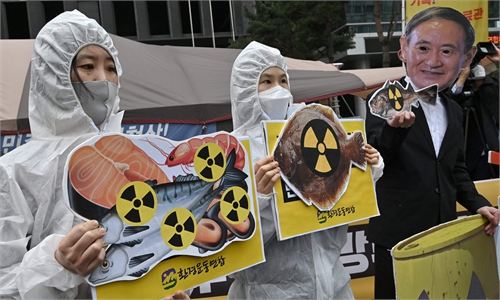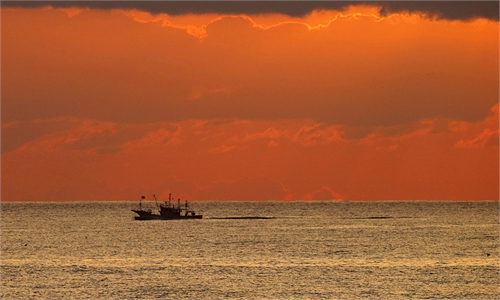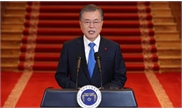3rd-party supervision of radioactive water dumping urged; if only Hualong One safety measures were adopted by Fukushima: industry insiders
Insiders urge 3rd-party supervision of radioactive water dumping
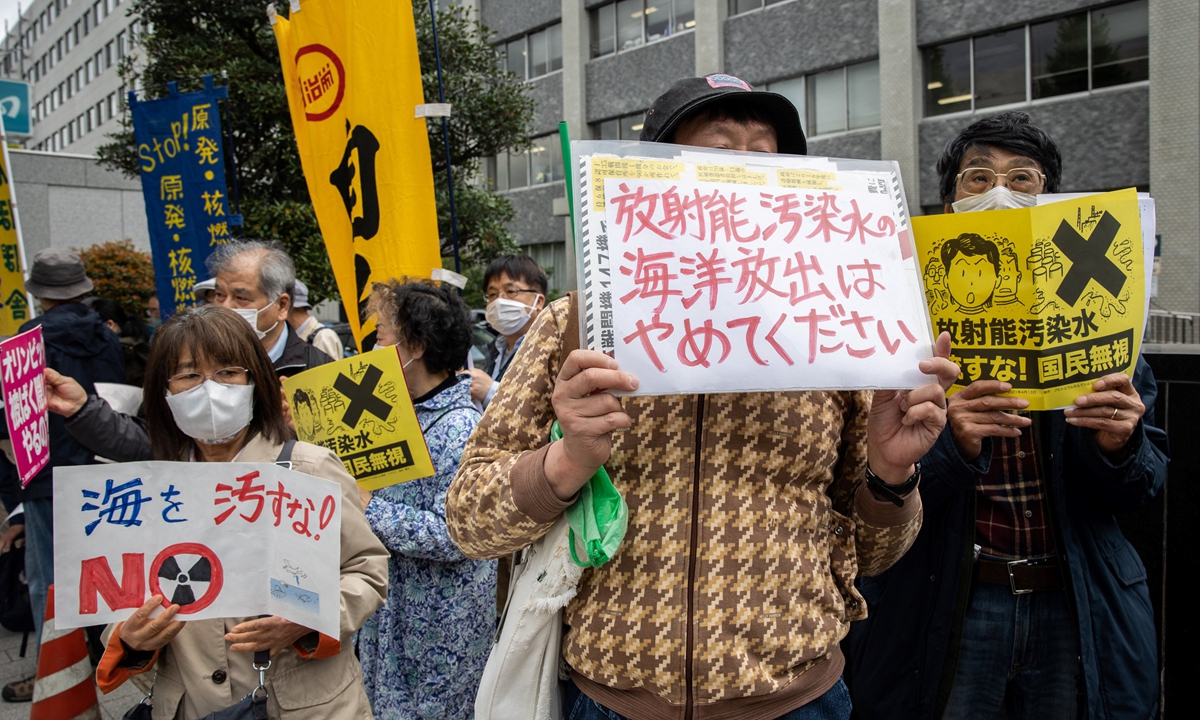
Demonstrators hold slogans during a protest against the Japanese government's plan to release more than a million tonnes of treated water from the stricken Fukushima nuclear plant into the ocean, outside the prime minister's office in Tokyo on April 13, 2021. Photo: AFP
Chinese nuclear power industry insiders on Wednesday urged third-party supervision to ensure every drop of radioactive water that Japan's Fukushima dumps into the ocean conforms to standards, given the previous infamous record of the Japanese nuclear power operator in handling the nuclear accident and the density of the radioactive substances in the wastewater.
Chinese insiders made such an appeal at the ongoing China Nuclear Energy Sustainable Development Forum held in Beijing on Wednesday, a day after Japan's decision to dump the wastewater containing radioactive substances into the ocean.
It is normal in nuclear activities to generate wastewater and to depose them after treatment under universal standards, but dumping radioactive wastewater from the Fukushima nuclear power plant which recorded the highest-level nuclear accident is completely different from releasing wastewater from normally operated power plants, Chinese insiders said.
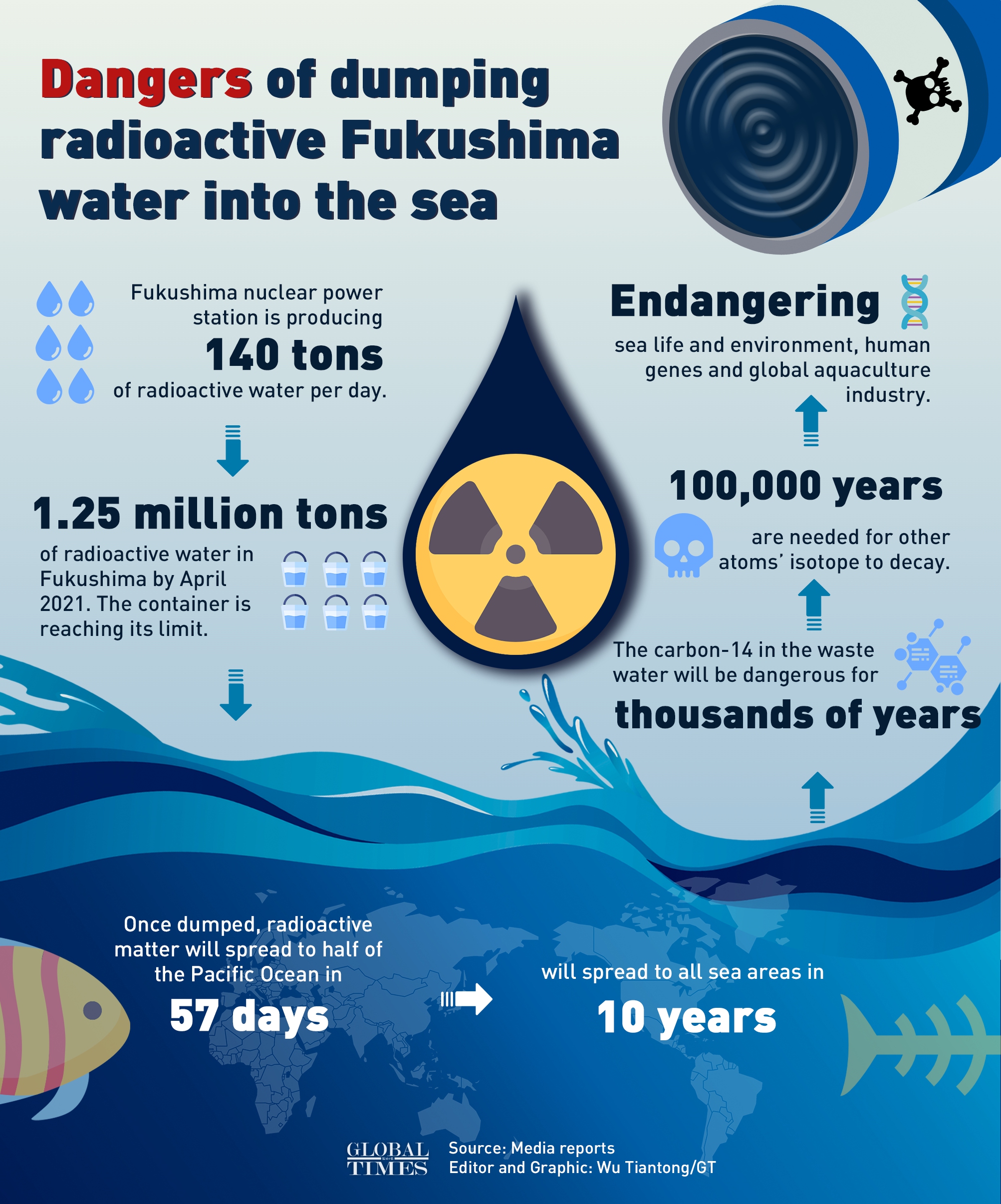
Can radioactive water be safely disposed? Check out this infographic to understand dangers of dumping Fukushima's radioactive water: Infographic: Wu Tiantong/GT
The claimed treated water stored in Fukushima tanks still possess dozens of radioactive substances that cannot be removed. Because the seawater that was used to cool down nuclear reactors in the 2011 disaster was also directly exposed to nuclear fuel, making it more serious in both density and amounts of radioactive substances, said Gui Liming, an expert on nuclear safety at Tsinghua University.Statistics from Tokyo Electric Power Company (TEPCO) showed there are 62 types of radionuclides in nuclear wastewater. In August 2018, environmentalists analyzed the data and found the treated wastewater was far more than residual tritium. Among them, the nuclear waste water detected in 2017 had 60 times of exceeding standard of iodine-129. The strontium-90 also exceeds normal standard, Zhao Lijian, a spokesperson from Chinese Foreign Ministry said on Wednesday.
The scenario is totally another story for the wastewater from a normally operated nuclear power plant, where wastewater normally generates from daily maintenance and valve switch. After repeated dilution and treatment, few radioactive substances would be left before the wastewater is discharged, Gui said.
Furthermore, industry insiders said the infamous record of TEPCO cannot convince the public or other countries that the company will follow standards in the process of dumping the wastewater.
Dumping Fukushima's radioactive water into the ocean is a matter of concern for not only Japan but also all neighboring countries. We have to ensure the discharge is carried out under the third-party supervision of International Atomic Energy Agency (IAEA) and to make sure filtration capability and data of TEPCO's ALPS (Advanced Liquid Processing System) is always under supervision, a nuclear power industry insider working with a leading Chinese nuclear power company on condition of anonymity told the Global Times on Wednesday at the forum.
The industry observer also suggested that China should cooperate with neighboring countries to increase the environment monitoring facilities across coastal waters and launch a long-term monitoring project to detect the impact of Japan's wastewater dumping on the marine environment.
China and South Korea expressed strong dissatisfaction over Japan's unilateral decision to dump nuclear wastewater in the sea at the first meeting of China-Korea maritime affairs dialogue and cooperation mechanism. Both sides urged Japan to prudently handle the issue on the basis of full consultation with international agencies and neighboring countries, and the substantial participation of relevant countries and international agencies.
When there are many other options, Japan's decision to dump radioactive water into the ocean is "irresponsible." Its behavior frustrates public confidence to understand and accept nuclear power as a new clean energy, some industry observers said.
Learning from the Fukushima nuclear disaster, China has been placed safety as the lifeline of its nuclear energy industry.
Ye Qizhen, an academician of the Chinese Academy of Engineering, listed different standards that each country stipulates on the nuclear power industry at the forum, and said that China's forefront third-generation nuclear technology, represented by the Hualong One nuclear reactor, reflects the highest safety standards in the world.
Zhan Hui, an engineer at the Nuclear Power Institute of China, told the Global Times on Wednesday that to ensure nuclear power safety, China has managed to avoid any possible risks starting from designing the nuclear technology.
The double-shield design of Hualong One not only deals with internal pressure brought about by possible accidents and prevent nuclear substances from leaking out, but also endures outer incidents, Zhen said.
Its outer shield could protect the reactor from an accidental collision from a Boeing 747 and its structure would still be complete after an 8.0-magnitude earthquake, he explained.
Some industry observers said if the Fukushima nuclear plant adopted such technology 10 years ago, accidents of nuclear leakage might not be that severe.

